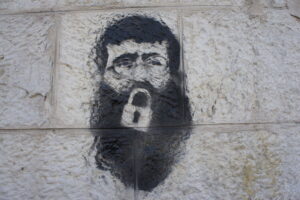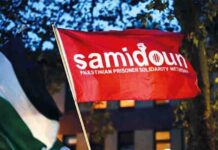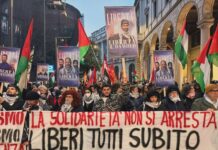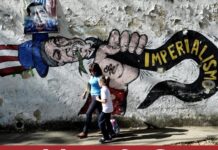Khader Adnan, Palestinian political prisoner held under administrative detention without charge or trial, and former hunger striker whose case drew world attention to the plight of Palestinian prisoners in Israeli jails, has been ordered to solitary confinement for two weeks by Hadarim prison administration. Take Action: Demand the end of isolation and solitary confinement against Palestinian prisoners!
Adnan, 37, a baker from Jenin, launched his 66-day hunger strike in February 2012 when he was previously held in administrative detention without charge or trial, garnering international support and attention that led to his release. The iconic graphic image of Adnan by Palestinian artist Hafez Omar c overed the streets of Palestine and appeared in protests around the world. He is married to Randa and the father of five children.
overed the streets of Palestine and appeared in protests around the world. He is married to Randa and the father of five children.
Since his release, he has been a leading figure in supporting Palestinian prisoners’ struggle for freedom and justice, as well as international prisoners’ hunger strike campaigns.
He was re-arrested by Israeli soldiers on July 8, 2014 and ordered to administrative detention without charge or trial; his administrative detention was renewed for an additional six months, again without charge or trial and on the basis of secret evidence, in January 2015. Adnan launched a one-week protest hunger strike, which he stated in advance would last for one week, and would be resumed with any future administrative detention orders.
Randa Adnan, who had previously been allowed a family visit for the first time since Khader’s arrest in July after repeated denials, announced that he had been ordered to solitary confinement for two weeks by the prison administration. This action came in retaliation for a Friday prayer sermon that Adnan delivered to his fellow prisoners in the prison yard last Friday, April 10, in which he denounced the ongoing crimes of the occupation against Palestinian prisoners, particularly sick prisoners, and mourned the loss of Jaafar Awad, 22, who died early Friday morning two months after his release from prison, after he became critically ill and was mistreated inside the prisons.
The use of solitary confinement and isolation, particularly long-term solitary confinement, is internationally recognized as inhumane treatment amounting to torture. “Segregation, isolation, separation, cellular, lockdown, Supermax, the hole, Secure Housing Unit (SHU)… whatever the name, solitary confinement should be banned by States as a punishment or extortion technique,” said the United Nations Special Rapporteur on torture, Juan E. Méndez, to the UN General Assembly. As Addameer and PHR report, “The United Nations Special Rapporteur on Torture details the severe psychological effects of solitary confinement, including that it causes ‘psychotic disturbances’… anxiety, depression, anger, cognitive disturbances, perceptual distortions, paranoia and psychosis and self-harm.’ Solitary confinement can also cause physiological damage. Prisoners often develop ‘gastroenterology, vascular, urinary and reproductive system illnesses as well as suffer from sleep disturbances and extreme fatigue. They also complain of tremors, recurrences of heart palpitations, recurrences of excessive perspiration.’
Palestinian political prisoners have repeatedly protested the use of solitary confinement and isolation as an Israeli prison policy, striking to end isolation in the mass Karameh hunger strike of 2012 – which led to the release from isolation of Ahmad Sa’adat and 18 other Palestinian leaders, some of whom had been isolated for years – and most recently in December 2014, in which hundreds of Palestinian prisoners struck to demand the release from isolation of Nahar al-Saadi, who had been isolated for 570 days. Despite these strikes, and Israeli commitments to end the use of isolation, dozens of Palestinian prisoners continue to be isolated and placed in solitary confinement.
Take Action! Demand an end to the use of isolation and solitary confinement:
1. Sign this statement demanding an end to the use of solitary confinement and isolation. Demand Israeli officials immediately release Adnan from solitary confinement – and end his administrative detention without charge or trial.
2. Protest at the Israeli consulate or embassy in your area. Hold a protest, or join a protest with this important information. Hold a community event or discussion, or include Palestinian prisoners in your next event about Palestine and social justice.
3. Boycott, Divest and Sanction. Hold Israel accountable for its violations of international law. Don’t buy Israeli goods, and campaign to end investments in corporations that profit from the occupation. Learn more at bdsmovement.net.
LETTER: END THE USE OF SOLITARY CONFINEMENT AND ISOLATION
To Brigadier General Dani Afroni, Military Judge Advocate General and Prime Minister Benjamin Netanyahu;
I write today to call for an immediate end to the use of solitary confinement and isolation against Khader Adnan, and all Palestinian prisoners in Israeli jails.
Khader Adnan is being held under administrative detention without charge or trial. He has been repeatedly imprisoned – without charge, without trial – and targeted for his political activities by the Israeli military. He is now being isolated for two weeks in Hadarim prison for political and religious comments on the death of Jaafar Awad due to Israeli medical negligence.
Isolation and solitary confinement are forms of torture, and Israel’s use of administrative detention is contrary to international law and human rights standards. Isolation is recognized by the UN’s Special Rapporteur on Torture as a form of torture when used for extended periods.
In May 2012, Israeli prison authorities agreed to end the use of solitary confinement in order to end the mass hunger strike of thousands of prisoners. That agreement has repeatedly been broken by Israeli authorities.
I demand the immediate removal of Khader Adnan from solitary confinement; the release of Khader Adnan and all other Palestinians held in administrative detention without charge or trial; and the end to the use of isolation and solitary confinement against Palestinian prisoners.
Error: Contact form not found.
Discover more from Samidoun: Palestinian Prisoner Solidarity Network
Subscribe to get the latest posts sent to your email.




